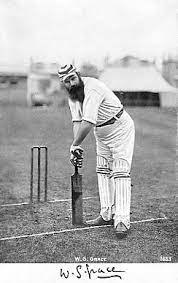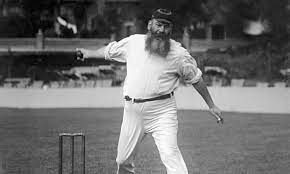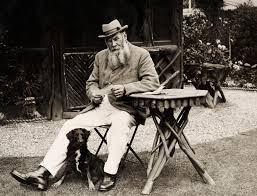
David Robertson tells us the story of the Great Cricketer in Kent:
More than 150 years after his first appearance in Kent, W.G. Grace remains the most recognised name in the world of cricket, He had a special affection for Kent’s cricket traditions and especially Canterbury Week, appearing for the first time as a seventeen year-old in 1866.
It was only the eleventh match of his long and illustrious first-class career. Playing for the South of England against the North he was dismissed for a duck in the first innings and run out for six in the second. He was one of three Grace brothers appearing in that match.
This snippet of information is contained within one of the most remarkable volumes of cricket research ever undertaken: “The Chronicle of W.G.” by J.R. Webber, which came to me as a birthday present in April of last year. It records every match, major and minor, that he appeared in from his debut in minor cricket at the age of twelve to his retirement on 8th August 1914. His final match was at Eltham, three weeks after celebrating his sixty-sixth birthday. He lived for only fourteen more months.
The appeal of Kent grew as his career progressed and probably strengthened following the controversial rift with, and departure from Gloucestershire, in 1899. His association with Crystal Palace and the formation of the London County Club and the attraction of club cricket in the county, will have further strengthened his links with Kent.
Following his final retirement from first-class cricket, he moved with his wife Agnes to Kent, taking up residence at “Fairmount”, Mottingham Lane, Bromley. He remained a keen sportsman, playing golf, bowls and curling as well as cricket. He appeared regularly for Eltham and played on a number of north Kent grounds. Only 15 months before his death, he scored an undefeated 69 for Eltham.
The county of Kent can justifiably lay claim to William Gilbert Grace as a part of its cricket heritage, given his record of achievements in the county, his final years as a resident, and his chosen resting place more than a century ago.
Whilst this story is about “W.G.”, the Grace family connection with Kent and Canterbury Week began four years earlier, on the eve of the great Festival. In Richard Tomlinson’s 2015 biography, “Amazing Grace”, we learn that a chance meeting in 1862 between Henry and Martha Grace (W.G.’s parents) and Robert Fitzgerald (an MCC committee member) was responsible for the first appearance of one of the Grace family, in this case W.G.’s elder brother Edward Mills Grace. Fitzgerald was by all accounts, “in an agitated state” as the All England team was a player short and “could Henry help?” He summoned E.M. to Canterbury for the game starting the following Monday, and there the Grace link to Canterbury Week and to Kent, began.
Of W.G.’s 880 first-class matches, sixty-three had a Kent association either through Kent being the opposition or the games being played on Kentish soil. (I write “on Kentish soil” rather than “against Kent”, because W.G.’s earliest appearances were in matches during Canterbury Week which sometimes did not involve the Kent XI).
Most were as a member of MCC, Gloucestershire or the South of England teams. W.G.’s move to the London County Club, following his departure from Gloucestershire, shows no record of Kent having played against them during its short life, despite that club’s ground being on what was then Kent soil. Many of their matches were played against the first-class counties. Kent played on the Crystal Palace ground in the 1860s.
Grace played 42 major matches in the county. Twenty-seven were at Canterbury, and four at Blackheath against Gloucestershire. At Gravesend and Maidstone where he also played four times at each ground, he averaged over 100 in seven innings at Gravesend and in eight innings at Maidstone. The other three were on The Common at Tunbridge Wells. The total includes two against XIII of Kent and a single match against a combined Kent and Sussex side.
Three times in the mid-1870s he led a Kent and Gloucestershire side against an England XI as part of the Canterbury Week festivities. The first two were won by the joint counties XI and the third was drawn.
He played once for Kent as a “Given Man”, against England during the 1877 Canterbury Week. He scored a half century in each innings and took three wickets in the drawn match.
The bare facts record that of all the games between Kent XI’s and sides that included W.G., Kent were the victors on only ten occasions and the County XI had to wait until their nineteenth attempt before they tasted victory against him for the first time.
Although regarded primarily as a batsman, on Kentish soil against the County XI and representative sides, W.G. displayed outstanding all-round ability. In Kent he scored ten centuries, one double century and the one record treble. At Canterbury, he hit six hundreds and the earliest first-class triple hundred. His 344 in 1876, remains to this day the highest individual score on the famous St Lawrence ground and the only triple hundred scored there.
After a day’s cricket he joined in the festivities. He was very popular with “The Old Stagers”, during their annual performances, a traditional part of The Week’s festivities, and at the social events that followed the day’s cricket
Milton Small records in a second volume “Canterbury Cricket Week 1842-1891 that, in 1889, “On the Thursday evening a complimentary Banquet was given to Dr. W.G. Grace, in the Forresters’ Hall. The toast of the evening was proposed by Lord Harris, Doctor Grace making a witty and amusing speech in reply.”
In all first-class matches with which Kent and Grace were associated he played 99 innings and was undefeated on twelve occasions. But like all outstanding batsmen he had some bad patches. On 28 occasions he was dismissed for a single figure score and made nine ducks.
His all-round abilities shone in these matches whether they were for Gloucestershire or in the many representative games that formed such an attractive feature of the early Canterbury Weeks. It was not only his batting that won matches. On a good number of occasions he took vital wickets, including ten or more in a match six times. His most outstanding bowling performance was ten wickets in the second innings and a total of fifteen in the 12-a-side match for MCC against Kent in the Canterbury Week of 1873.

His batting and bowling performances in all of the matches exceeded his career averages. He scored 4,477 runs in his 99 innings with 12 not outs, averaging 57.46. He bowled 2,159 overs with 818 maidens, conceded 3,669 runs and took 219 wickets at 16.75. By comparison his career batting average was 39.45, and 18.15 bowling.
In the second half of his career, when the County Championship had been established and there were regular Kent v Gloucestershire games, Kent had a couple of bowlers who got the better of him. Fred “Nutty” Martin, one of the country’s best medium-pace bowlers, dismissed him fourteen times in eleven matches, four times in both innings, and Alec Hearne, a leg break and off-spin bowler, was successful on ten occasions. Martin dismissed him three times before he had scored. In Kent’s final game against Grace, 22 year-old Bill Fairservice in only his second season dismissed him in both innings. And it fell to Lord Harris to claim W.G.’s wicket in 1876 but only after he had scored 344!
His 344 was in the second innings for the Gentlemen of MCC against Kent during Canterbury Week. The visitors had been forced to follow on after being dismissed for 144 in reply to Kent’s 473 with Lord Harris contributing 154. It was an innings of enormous concentration and stamina. And it came appropriately in his 200th first-class game.
Kent have had many outstanding batsmen since those early days yet not one has come close to that score on this famous old ground, and it was the first of three innings in ten days during which Grace scored a total of 839 runs including a second triple hundred.
Much has been written about that innings. But his second highest in Kent merits special mention. It was when playing for Gloucestershire at Gravesend in 1895. His innings of 257 and his all-round performance in a remarkable victory for the visitors, is described by Howard Milton in his delightful and informative “Kent County Cricket Grounds” published in 2020 to mark Kent’s 150th anniversary. Grace was on the field for every ball of the match with an undefeated second innings 73, having also bowled 43 overs in Kent’s first innings of 470. It was thought by the Bristol Times and Mirror to be “a record that has never been gained by any other player”. Not bad for a man approaching his 47th birthday.
He avoided being mobbed by the admiring crowd as, victorious, he left the field, but the crowd waited for him to change. When he appeared from the pavilion he received “three hearty cheers as he made his way along the street to his hotel, a triumphal procession through the town.” The Bristol Times and Mirror described it as “One of the most wonderful games on record.”
One suspects that his strong personality and his following also at times got to the opposing players. There is the story of the occasion during the 1877 Canterbury Week, the year following his record-breaking 344. He was invited to play for Kent against an All-England XI as a “Given Man”, but he missed his train from London and arrived late, though still in time to join Lord Harris at the wicket. Reports suggest that he should have been out first ball, but the bowler failed to appeal for lbw, doubtless much to the relief of the umpire and the delight of the large gathering of excited spectators who would have been less partisan in those days. He went on to score a half-century in both innings.
There were further runs and wickets in his final decade, but the years were beginning to take their toll on his performances. His final game against Kent was in May 1903 when aged 54 years and 315 days. Appropriately it was at Lord’s, playing for MCC. It was one of the infrequent occasions that Kent finished on the winning side, by three wickets. In October 1915 Grace suffered a stroke while working in Fairmount’s garden – in which he grew the choicest asparagus – and died at home a few days later. It was said that the distress caused by Zeppelin raids contributed to his demise. Grace complained that, unlike the deliveries from fast bowlers, it was a threat that he could not see coming.

Kent has not forgotten W.G. or his links with the county. Between 1990 and 2015 three Services of Commemoration have been held at St George’s Church, Beckenham, and a Grace Exhibition and an Act of Remembrance at his graveside have all been staged. The exhibition on the most recent of these occasions included the original scorebook, a part of the Kent County Cricket Club’s collection, that records run by run Grace’s record score at Canterbury’s St Lawrence ground in 1876.
An Honorary Kentish Man – not born in, but now in permanent residence to the west of the River Medway.
0 Comments